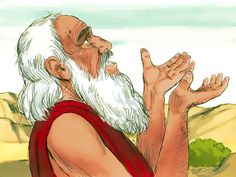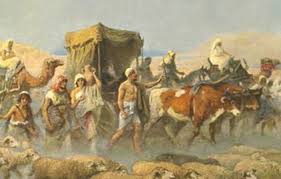Abraham and his God: Partners in Crime?
May 28, 2014

(left. Abe haggles with God)
"If the patriarch did not provoke any displeasure in own God with a regular knocking down of the price from 50 to 10, but indeed succeeded with Him, this proves the views which the Jewish God entertains with regard to such tendencies."
(Editor's Note: Eugen Duhring, a 19th century German philosopher was a critic of Jewish power and influence in German society. I present this short excerpt to prompt discussion of Judaism which may be a liability for Jews and Christians alike.)
by Eugen Duhring
from "On the Jews" (1881) Ed. Alexander Jacob pp. 92-94
How trading and marketing belongs to the original characteristics of the Jews is demonstrated by a story in the 18th chapter of the first book of Moses, which indeed would make a comic impression if, for the rest, the Jewish character were not such a sad fact of humanity. That story is indeed a contract which Abraham himself concludes with the Lord God.
The latter wishes to punish and destroy the city of Sodom on account of its heinous sinfulness. Abraham makes objections to Him and thinks that the Lord would be a better judge if he came across 50 just people in the city for whose sake He would preserve the city, so that innocent people would not have to suffer.
After Abraham in the interest of these supposed 50 just people, has the approval of the Lord, he comes forth with a smaller offer. He has miscalculated; the Lord would perhaps find only 45 just people.
Correctly the Lord too lets the five be taken off but Abraham has now one finger, and now follow the others, and finally the entire hand is claimed. The next price of preservation is 40 just people, therefore again five less. Then the trade goes down in levels from 30 to 20 to ten and the Lord settles with Abraham after He has agreed with him that the probable finding of ten just people should suffice to preserve the city.
If the patriarch did not provoke any displeasure in his own God with with a regular knocking down of the price from 50 to 10, but indeed succeeded with Him, this proves the views which the Jewish God entertains with regard to such tendencies.
"GOD" PROVES TO BE A KNAVE
The tendencies are therefore self-explanatory; they are indeed sanctified. The dealing from price to price is still something relatively innocent; it proves only the haggling mentality. But the Jews have in their original documents sanctified quite other things, namely even, among others, refined stealing.
Or what else is it when, before the Exodus from Egypt, the Jewish woman borrows from her neighbours gold and silver vessels, as well as clothes, in order to purloin them later?
 This borrowing and purloining is, as one can read in the 3rd, 11th and 12th chapter of the second book of Moses, an express prescription of the Lord God which was delivered to the Jews by Moses. They should not move empty-handed, and at the same time, the way is also shown to them by their God how they should succeed in possessing the precious objects of the Egyptians in order to run away with the objects borrowed with deception.
This borrowing and purloining is, as one can read in the 3rd, 11th and 12th chapter of the second book of Moses, an express prescription of the Lord God which was delivered to the Jews by Moses. They should not move empty-handed, and at the same time, the way is also shown to them by their God how they should succeed in possessing the precious objects of the Egyptians in order to run away with the objects borrowed with deception.This acquisition of the gold, silver and clothes of the Egyptians is typical; it betrays the Jewish mentality in its most naive form. One will never forget it throughout world history: for, one is constantly reminded anew of this sanctified art of acquisition.
The chosen and sanctified self-interest which forms the central theme in everything which emerges from the Jews has here its original form. It is the key to Jewish life, insofar as morality, and the accompanying religious way of observation come into question.
----------
Eugen Karl Dühring (1833-1921) was a German philosopher and economist, a socialist who was a strong critic of Marxism. After a legal education he practised at Berlin as a lawyer until 1859. A weakness of the eyes, ending in total blindness, occasioned his taking up philosophy. In 1864 he became docent of the University of Berlin, but, in consequence of a quarrel with the professoriate, was deprived of his licence to teach in 1874.
--
Note from Dan:
The "18th chapter of the first book of Moses" that Duhring referred to is simply the 18th chapter of GENESIS.
The translator of Duhring's German didn't translate that very well. Probably a literal translation is "Book of Moses" in German, though there is no "Book of Moses" per se.
It means the five books attributed to Moses. The Christian names for the books are derived from the Greek Septuagint and reflect the essential theme of each book:
- Genesis: "origin"
- Exodus: Exodos, "going out"
- Leviticus: Leuitikos, "relating to the Levites"
- Numbers: Arithmoi, contains a record of the numbering of the Israelites in the wilderness of Sinai and later on the plain of Moab.
- Deuteronomy: Deuteronomion, "second law", refers to the fifth book's recapitulation of the commandments reviewed by Moses before his death.
First Comment from Marcos:
The Bible is as much a book of historical facts as it is a book on moral guides of conduct. Confusing the two is a frequent error from casual readers. With the exception of (sinless) Jesus and perhaps Daniel and John the Baptist, every other human depicted in the Book is shown with his sins, warts and all. Abraham sinned. This is one of the characteristics that make the Bible even more credible; it doesn't fear handling the truth about humankind. The mature reader must understand, for example, that we are supposed to admire Peter in his willingness to die for Christ, and not for his moment of cowardice in denying the Lord three times. If any person handpicks a special situation in order to justify his own sin, he is an hypocrite.
The whole Old Testament environment was indeed barbaric, since the Holy Spirit was not restraining evil at the time, but it is the same God as in the New. The barbarism only reinforces the mess that sin created and the need of redemption. Gnostics preach the contrary. I suggest for your readers the book "Christianity is Jewish", by Edith Schaeffer, Francis Schaeffer's wife.







Curtis said (May 30, 2014):
Great article! This article points out how the Jews use the Biblical stories of Abraham haggling with God in Genesis: and the “borrowing†of gold and other items by the Hebrews on the way out of Egypt (Exodus), as proof of being “the chosen†of God, superior and so on. It is used as the foundation and justification for the Jewish “acquisition†of possessions by any means especially from the goy.
The irony of this event (of the borrowing of gold and silver and such from the Egyptians) carries this caveat. A short time later the Israelites arrived at Mt. Sinai and Moses went up to talk to God. He was gone for 40 days and the people became restless. In Moses absence the people demanded that Aaron make them a golden calf so they could worship it. The idol was made from the very gold they “borrowed†from the Egyptians! When Moses returned he ordered the calf burnt in the fire, ground it into powder, threw it in the water and made the people drink! Many were killed because of this grave error!
By the time of Christ this thinking was solidly ingrained into the Jewish psyche. By then—possessions—had developed into the measure of a man’s approval before God. The more one had the more right and favor one had with God. The need for “things†had so warped the Jewish thinking that Jesus spent a great deal of time discrediting and demystifying this erroneous belief. Unfortunately he was unsuccessful yet his teaching stands. The Apostle Paul even warned that the love of money is the root of all evil and many people have been destroyed because of this error.
Historically from that time until today the Jews continue to follow the same error by breaking the commandment of thou shalt not covet! Sadly they do not see that if they hadn’t “acquired†the gold from the Egyptians there would have been no golden calf, no idol, no deaths, no displeasure from God, Moses and so on. Riches are most often a curse. To give equal admonition many Christians suffer from the same folly; covetousness is not exclusively a Jewish sin.